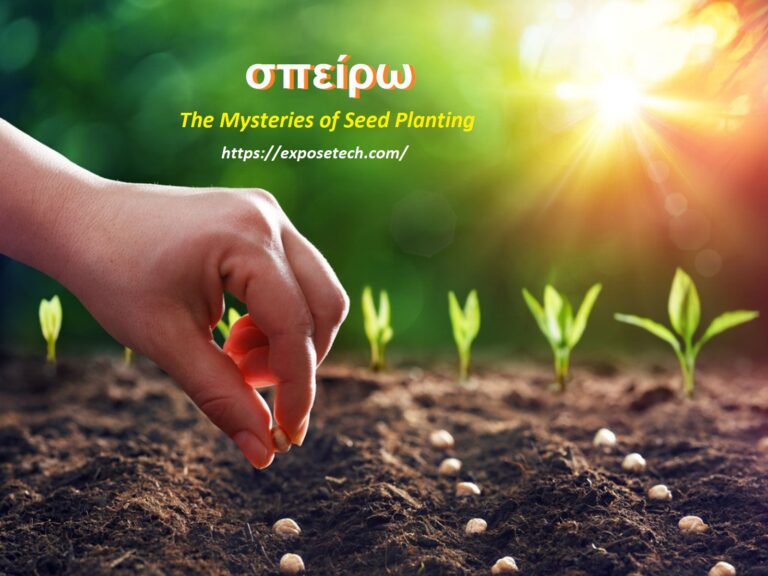In the realm of agriculture and horticulture, the act of planting seeds transcends mere physical motion; it embodies a profound connection between humanity and nature. At the heart of this timeless exercise lies the Greek phrase “σπείρω” (speíro), encapsulating the essence of sowing seeds and fostering growth. Delving into the depths of this concept unveils a wealthy tapestry of cultural significance, medical inquiry, and philosophical contemplation.
The Cultural Tapestry of σπείρω:
Embedded inside the Greek language, “σπείρω” holds a cultural resonance that extends a ways beyond its linguistic confines. For historical Greeks, sowing seeds changed into now not merely a means of agriculture but a sacred ritual intertwined with spiritual beliefs and societal values. The act of planting seeds symbolized the cyclical nature of existence, death, and rebirth, mirroring the everlasting rhythms of the natural international.
Moreover, σπείρω observed its manner into the cloth of Greek mythology, with memories of Demeter, the goddess of agriculture, bestowing the gift of agriculture upon humanity, coaching them the artwork of planting and nurturing seeds. These myths served as allegorical representations of the human quest for sustenance, prosperity, and spiritual fulfillment, in addition elevating the significance of σπείρω in Greek subculture.
The Scientific Inquiry into Seed Planting:
Beyond its cultural connotations, σπείρω has additionally been a topic of medical inquiry, drawing the eye of botanists, agronomists, and agricultural scientists at some stage in the a long time. Understanding the intricacies of seed planting includes unraveling the mysteries of germination, growth, and duplicate, shedding light on fundamental standards of plant biology.
Germination, the technique via which a seed sprouts and begins to grow, lies at the coronary heart of σπείρω. It involves a delicate interplay of environmental factors which includes temperature, moisture, and soil conditions, all of which have an impact on the success of seedling emergence. Through centuries of experimentation and remark, scientists have unraveled the complicated mechanisms underlying germination, paving the way for advancements in agriculture and crop manufacturing.
Moreover, σπείρω encompasses not most effective the act of planting seeds but also the cultivation practices that comply with, including irrigation, fertilization, and pest management. These practices are knowledgeable with the aid of medical standards geared toward optimizing plant growth, maximizing yield, and making sure food protection for burgeoning populations.
The Philosophical Implications of Seed Planting:
Beyond its realistic packages, σπείρω inspires profound philosophical contemplation, inviting us to ponder the deeper mysteries of life, growth, and renewal. In sowing seeds, we partake in a timeless ritual that bridges the space among the finite and the countless, the temporal and the everlasting.
The metaphor of σπείρω extends beyond the realm of agriculture, serving as a robust symbol of human undertaking and aspiration. Just as a seed consists of the ability for boundless boom and transformation, so too can we harbor the seeds of possibility inside ourselves, waiting to be nurtured and cultivated.
Moreover, σπείρω reminds us of our interconnectedness with the herbal international, urging us to tread gently upon the earth and steward its assets with care and reverence. In cultivating the land, we domesticate our souls, forging a deeper connection to the rhythms of nature and the cycles of life.
Conclusion:
In the enigmatic depths of “σπείρω,” we discover a tapestry woven with threads of cultural background, clinical inquiry, and philosophical contemplation. As we till the soil and sow the seeds of our dreams, allow us to heed the knowledge of a long time beyond and include the timeless ritual of increase and renewal. For within the act of σπείρω, we find out no longer most effective the bounty of the earth however also the boundless capacity of the human spirit.

